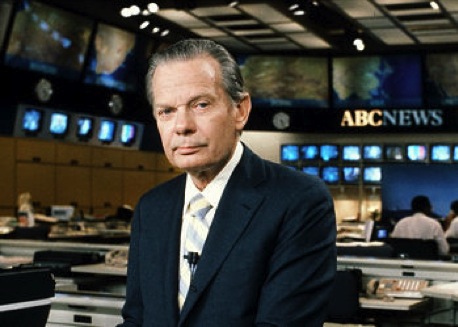Brinkley on the brink of calling it a day at 1996 Republican convention
20/07/16 11:20

Note to readers: David Brinkley, who died in 2003 at age 82, was in his last cycle of national political conventions during the 1996 Republican gathering in San Diego. He wasn’t doing many interviews at the time, but sat still for this one. This article originally was published on Aug. 14, 1996.
By ED BARK
@unclebarkycom on Twitter
SAN DIEGO -- It will be the end of an era or two when David Brinkley stops being a fixture at national political conventions.
The ongoing Republican gathering is his 21st. The Democrats in Chicago will be his last. At age 76, it’s time for him “to do something else,” Brinkley said Tuesday from a makeshift office at the ABC News trailer compound off San Diego Bay. “I don’t know what. It’s all pretty much up in the air.”
He also will be leaving Sunday morning’s This Week with David Brinkley after 15 years. But he disputes a current TV Guide story that says he’ll stay with the program until the presidential inauguration on Jan. 20.
It could be much sooner than that, perhaps “even sometime this summer,” Brinkley said. “I don’t know precisely when it will be. I don’t know how they think they know.”
Jacket-less in a wide-striped shirt, maroon tie and navy blue suit pants, the usually press-shy TV news pioneer cordially endured an interview with a reporter who was still a grade-schooler in 1956. That’s when Brinkley, in tandem with Chet Huntley, anchored his first pair of national political conventions. The network was NBC, and the inclination was to televise every last minute the politicians had to offer. On several convention days, the soon-to-be-famous Huntley-Brinkley team began convention coverage at 9 a.m. and stayed on the air until 3 o’clock the following morning.
“The difference was that people were interested, found them exciting and tuned them in in enormous numbers because they’d never seen anything like it before,” Brinkley said. “Now they’re largely indifferent. It’s just another political show.”
Not that politicians of both parties have stopped trying to use the networks as dispensers of their modern-day infomercials. At his Tuesday morning press briefing, for instance, Republican National Committee chairman Haley Barbour griped that CBS was the only broadcast network not to carry a brief, “powerful and moving” filmed tribute to Ronald Reagan. ABC was alone in shunning a previous speech by former President George Bush.
“Both parties want the whole network given over to them hour after hour after hour,” Brinkley said. “They will not be satisfied until they return to the glory days of the past, which will never come back.”
Monday’s convention coverage on ABC lasted all of one hour, as it did on rivals NBC and CBS. Brinkley didn’t even get on the air, although that wasn’t the original intention. A taped piece of his was scrapped because of lack of time, he said. ”Several things got left out, but we’re used to that. Didn’t pay any attention to it.”
Brinkley said he didn’t watch much of ABC’s coverage Monday night. Again, his trademark, clipped manner of speaking came into play: “I had other work to do, and I was doing it.”
ABC anchor Peter Jennings said it was “quite unnatural for me” to anchor the opening night’s coverage without Brinkley, who was scheduled to join him on Tuesday night. They have covered politics together since 1983, when Jennings returned from an extended assignment overseas to replace the late Frank Reynolds as anchor of World News Tonight.
“I was very conscious that David could pretty much make or break my political re-entry,” Jennings said. “Had he sneered at my faulty knowledge, had he been in any way heavy-handed, I’d have gone right down the tubes. He did quite the opposite. He was patient and indulgent, never overbearing. As a result, our relationship has some father-son qualities to it. So for me, he’ll be a big loss.”
Brinkley recalls the demonstration-plagued 1968 Democratic convention in Chicago as “the roughest” he has covered. But the “ugliest,” he said, was the 1964 Republican convention in San Francisco, from which Barry Goldwater emerged as the nominee.
“The delegates were really hostile and threatening and ugly to us,” Brinkley said. “Threatened us with physical harm. We had to get bodyguards. And we had to sneak into the hotels and sneak out.
“Goldwater himself was a fine man. I love him. I still do. But some of his followers thought we were flat-out Communists, or so they said. It’s ridiculous, but there it is.”
Today’s charges of “media bias” are both tame and predictable in Brinkley’s view.
“We do our jobs, and win or lose, what the hell, that’s it,” he said. “We don’t worry about it.”
Email comments or questions to: unclebarky@verizon.net
